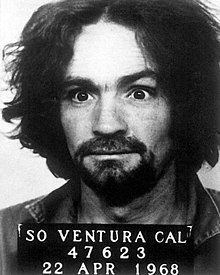
Back Charles Manson Afrikaans Charles Manson AN تشارلز مانسن Arabic تشارلز مانسن ARZ Charles Manson AST Çarlz Menson Azerbaijani Čarlzos Mensuons BAT-SMG Charles Manson BCL Чарлз Мэнсан Byelorussian Чарлс Менсън Bulgarian
Charles Manson | |
|---|---|
 Manson's 1968 mugshot | |
| Born | Charles Milles Maddox November 12, 1934 Cincinnati, Ohio, U.S. |
| Died | November 19, 2017 (aged 83) Bakersfield, California, U.S. |
| Known for | Manson Family murders |
| Spouses | Rosalie Willis
(m. 1955; div. 1958)Leona Stevens
(m. 1959; div. 1963) |
| Children | 3 |
| Conviction(s) |
|
| Criminal penalty | Death; commuted to life imprisonment |
| Accomplice(s) | Members of the Manson Family, including Susan Atkins, Mary Brunner, and Tex Watson |
| Details | |
| Victims | 9+ murdered by proxy |
| Signature | |
 | |
Charles Milles Manson (né Maddox; November 12, 1934 – November 19, 2017) was an American criminal, cult leader, and musician who led the Manson Family, a cult based in California in the late 1960s and early 1970s.[1] Some cult members committed a series of at least nine murders at four locations in July and August 1969. In 1971, Manson was convicted of first-degree murder and conspiracy to commit murder for the deaths of seven people, including the film actress Sharon Tate. The prosecution contended that, while Manson never directly ordered the murders, his ideology constituted an overt act of conspiracy.[2]
Before the murders, Manson had spent more than half of his life in correctional institutions. While gathering his cult following, he was a singer-songwriter on the fringe of the Los Angeles music industry, chiefly through a chance association with Dennis Wilson of the Beach Boys, who introduced Manson to record producer Terry Melcher. In 1968, the Beach Boys recorded Manson's song "Cease to Exist", renamed "Never Learn Not to Love" as a single B-side, but Manson was uncredited. Afterward, he attempted to secure a record contract through Melcher, but was unsuccessful.
Manson would often talk about the Beatles, including their eponymous 1968 album. According to Los Angeles County District Attorney Vincent Bugliosi, Manson felt guided by his interpretation of the Beatles' lyrics and adopted the term "Helter Skelter" to describe an impending apocalyptic race war.[1] During his trial, Bugliosi argued that Manson had intended to start a race war, although Manson and others disputed this. Contemporary interviews and trial witness testimony insisted that the Tate–LaBianca murders were copycat crimes intended to exonerate Manson's friend Bobby Beausoleil.[3][4] Manson himself denied having ordered any murders. Nevertheless, he served his time in prison and died from complications from colon cancer in 2017.
- ^ a b Juschka, Darlene M. (2023). "Chapter 4: Space Aliens and Deities Compared". In Freudenberg, Maren; Elwert, Frederik; Karis, Tim; Radermacher, Martin; Schlamelcher, Jens (eds.). Stepping Back and Looking Ahead: Twelve Years of Studying Religious Contact at the Käte Hamburger Kolleg Bochum. Dynamics in the History of Religions. Vol. 13. Leiden and Boston: Brill Publishers. pp. 124–145. doi:10.1163/9789004549319_006. ISBN 978-90-04-54931-9. ISSN 1878-8106.
- ^ "People v. Manson". Justia Law. Archived from the original on May 20, 2018. Retrieved May 11, 2019.
- ^ "Manson Murders Motive | Copycat Motive". www.cielodrive.com. Archived from the original on May 11, 2019. Retrieved May 11, 2019.
- ^ James Buddy Day (Director) (2017). Charles Manson: The Final Words. Pyramid Productions.